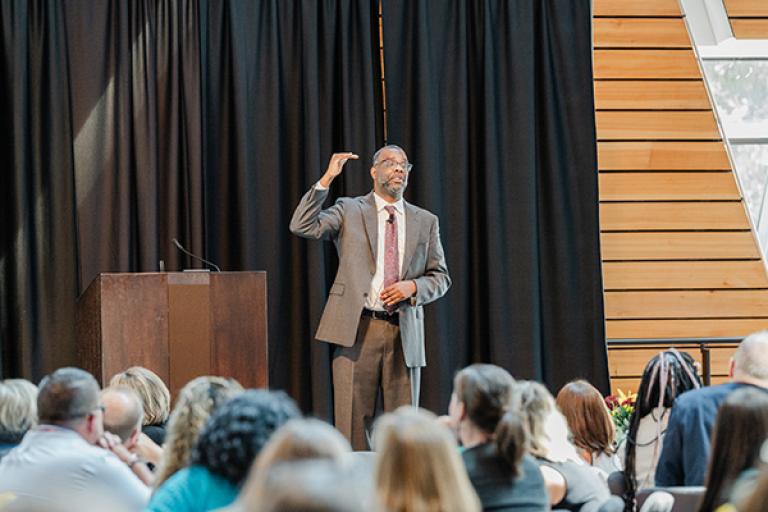2024 Spring / Summer
LEAD and literacy
On May 24, 2023, Minnesota Governor Tim Walz signed the Reading to Ensure Academic Development (READ) Act into law, with the goal to have every Minnesota student reading at or above grade level. The bill was sponsored by Rep. Heather Edelson (DFL-Edina), who was elected to the Minnesota House in 2018 and went straight to work on literacy policy.

“I was held back in third grade because I couldn’t read,” she says. “That experience had a lasting impact on my life. When I found out my twin sons had dyslexia, I went to work to do whatever I could to ensure they had the best interventions to help them succeed. There are so many kids that will benefit from the collaboration of honestly over 1,000 Minnesotans from teachers to parents to superintendents all across our state coming together to write the READ Act. It has been my great honor to work on this legislation.”
The passage of the act was top of mind of many educators last year. For Jane McDonald Black, literacy is always in her thoughts.
McDonald Black is the executive director of the JAB Foundation, which she founded with her husband. She is also a founding member of the Minnesota Hunt Literacy Path Forward team. Both organizations are devoted to improving literacy in the state.
“Minnesota is behind in our literacy efforts, and we are significantly underperforming,” she says. “Only 50 percent of our children are at grade level in reading.” Digging deeper, the statistics show that 58 percent of White children are at grade level, as well as 42 percent of children receiving free and reduced lunch, and 28 percent of children of color.
“We are in a crisis because there is no reason why our children can’t read,” she says. “We’re not hitting it out of the park with any of the groups. When only 28 percent of children of color can read, that’s heartbreaking. In Minnesota, White children experiencing homelessness have higher reading proficiency rates than children of color.”
McDonald Black sees the LEAD Conference as having the potential to get the needle moving in the right direction. “It is a unique opportunity to bring together so much of the educational leadership of Minnesota. They are highly focused and work hard every day to make a difference in children’s lives.”
In that spirit, McDonald Black and the JAB Foundation funded the participation of nationally recognized expert Kareem Weaver as one of the keynotes of the 2023 conference. “Kareem is highly focused on literacy and really believes it’s the civil rights issue of our time,” McDonald Black says. Weaver is the co-founder and executive director of FULCRUM (Full and Complete Reading is a Universal Mandate), which is committed to improving literacy rates by engaging school districts, universities, government, community organizations, and parent groups to cultivate excellent reading outcomes for all students.
“Literacy is our greatest civil right because, rather than being conscripted into the will of others, it promotes self-determination and empowers us to make informed choices,” Weaver says.
At LEAD, Weaver presented “The Quiet Parts Out Loud: Politics, Assumptions, and Literacy Growth.” In addressing what needs to be done to move Minnesota’s literacy rates forward across groups, he highlighted actions, sacrifices, and levels of change that need to be identified and held.
“He really took time to get background information on Minnesota and what’s happening here,” McDonald Black says. “He really spoke to how we can start to improve the outcomes of all students, but specifically children of color.”
McDonald Black says equity is not possible when children cannot read. “And we need to start there,” she says. “We can deliver. Places are starting to deliver the way reading is taught in evidence-based ways and it makes a significant difference.”
She is optimistic about the future. “With the passage of the READ Act, a significant number of things are happening with literacy,” she says. “There are a lot of questions and there is a lot of need to understand and find resources. The LEAD Conference has connected people to some of the answers and I fully believe we will start to see reading scores raised for everybody in the state and hopefully will significantly narrow gaps. There are great people working on this and it is extremely possible that 98 percent of our students can read.”
While LEAD 2023 had a strong focus on literacy, McDonald Black can envision other themes for future conferences, such as math. “I see LEAD giving everyone an opportunity to take a deep dive into other areas of educational challenges,” she says. “And hopefully, create a more equitable distribution of educational resources.”
View Kareem Weaver’s keynote address and other 2023 LEAD presentations.